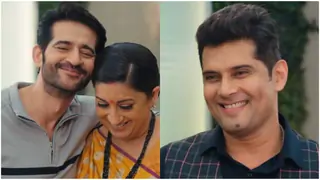| It's all Hindi to them! | |
| From 1958 to 1962 Hindi film tunes were so popular in Greece that musicians there were plagiarising them by the dozen, says M Bhaktavatsala. | |
| The plan was quite mad. Undertaking to travel with no money on a 'work and travel' basis I was sponsored by Granada TV of Manchester and Esso. A Canadian volunteered to join me. The sponsors gave us a IInd World War jeep and patted us off after taking away all our earthly belongings. Barely after crossing the English Channel we landed our first job as guards in a camping site in Bois de Bulogne in Paris. Some three months later after many jobs in many countries we found ourselves in Greece and found ourselves in a hospital near Thessaloniki in a little village called Veria, after an accident at dawn while descending the Ionian hill range. The village became our home for the next one month while recuperating at the home of Abraham Piperidis, the head of a working class family consisting of his wife and baby, wife's sister and his parents. Soon we got to be the centre of interest in the village, particularly me, not just because of dark skin but because I could sing to them their favourite songs— songs of the Hindi Films dating from 1949 (Babul, Andaz) till date (1958). Almost every evening was spent in different houses of the village where someone or the other would invite us to their homes for a soiree like Takes Strassinopolyos, the local Health Inspector, who one evening sang (for a change) for us. "Epthimo Naadikso Thinefkha Risthisi moo ya othi kaamathe yamonaa." Suddenly I realised he was singing a familiar Hindi song but with Greek intonations. I had picked up enough Greek like Effage (I want to eat), Messinkhoris (Excuse me), Neroe (water), Katse Ekki (Sit there), Ego dhenksaro Ellenika (I can't speak Greek) which did not enable me to elicit the information I wanted. Who composed the song? Was it based on a Hindi song? Or did another 'original' sire them both? One thing I knew of course was that right then Shankar Jaikishen's Badal was running in a hall nearby, and the song "Ai dil na mujse chupa, Sach bathaaa kya Hua," quite similar, was vastly popular. Much as I wished, I never went back to Thessaloniki. However, I now have the answer to the questions I could not ask thanks to the excellent research done by a couple of Greeks, Helen Abadzi, an educational psychologist, who knows Hindi, and Emmanuel Tasoulas, a dentist. They found that for a brief period from 1958 till 1962 Hindi films were most popular. At least one out of the 35 cinema halls in Thessaloniki played one or two Hindi films with sub titles every week regularly. Awaara in 1957 played for six weeks in a cinema hall called Alkazar. 'Land drenched in sweat' The invasion of Hindi films actually started in 1954 and lasted till 1968 during which period at least 111 films are known to have been imported. The titles were however changed. Aan became 'Mangala, the rose of India', Saqi 'Rasana— the Rose of Baghdad', Mela 'Love drenched in tears'. On a snowy day Mother India ('Land drenched in Sweat') opened without much advertisement in a theatre. The first few spectators were so moved by the film they stopped strangers on the road to tell them of it. Four hours later a waiting line two city blocks long had formed! Mother India played in some Greek town or the other for the next 10 years. Of course this phenomena occurred in many countries outside the Indic (Middle, South and Far East) world— like Russia, Turkey, Tunisia, Egypt, Uganda, even Columbia where songs became popular. But what happened in Greece was quite unique running counter to the belief that Hindi film songs were freely adopted from imports from all around the world while giving them a distinct Indian touch. During the period of fifties and sixties, Greek composers freely copied the tunes of Hindi songs substituting their own lyrics as they did not understand the original lyrics. For instance, 'Pyar Hua Ikrar Hua' (Shri 420) had four Greek versions turned into sad emigration pathos with words like "A train, a cursed train, a train will take you away". At least 26 Greek composers were engaged in this hugely lucrative endeavour as people loved the songs and the profits were huge. In one instance three composers went to a Studio at the same time to record different versions of the same song! The names of the original composers of the Hindi songs were never mentioned except in rare cases. Naturally there was a strong reaction, not from the plagiarised Hindi composers but from respected Greek composers like Vasilis Tsitsanis, a famous composer and bouzouki player. He considered the Indian composers giants, whose creations were "shamelessly expropriated" by worthless musicians. This and the fact that Greece entered the European Union made the Greeks look westward. The Hindi tunes were swept away by international hits emanating from the west. However nostalgia for the Hindi tunes asserted itself for generations after 1970's. Now called 'Indoprepi' (Hindi style) new renditions of old Hindi Film songs are an established genre. Those at the top of popularity chart in late 90's were 'Oso axizeis esy' (so much as you are worth) based on "Duniyawalon Se Duur" from Ujala, 'auti i nyxta menei' (this night remains) based on "Ulfat ka saaz chhedo" from Aurat (1953), 'kardia mou kaimeni' (my poor heart) based on "Duniya me Ham Aaye" from Mother India... Over 2000 years ago Alexander the Great from Greece conquered northwest India. It took the much maligned Indian cinema to conquer the heart of Greece through its wonderful legacy of the music of the 50's and 60's. What greater tribute can there be for those forgotten giants of Indian film music |


































